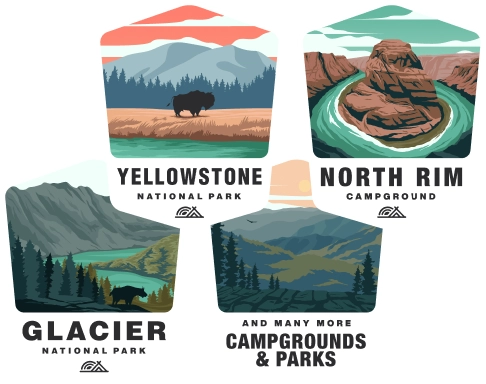Camping at TIPPECANOE RIVER FAMILY CAMPGROUND/ELECTRIC
Overview of Tippecanoe River State Park
Tippecanoe River State Park is located in north-central Indiana and is known for its scenic beauty, particularly the Tippecanoe River, which meanders through the park. The park offers visitors various outdoor activities such as camping, hiking, canoeing, fishing, and wildlife observation.
TIPPECANOE RIVER FAMILY CAMPGROUND/ELECTRIC
Tippecanoe River Family Campground within the park provides campers with the opportunity to enjoy the natural beauty of the area while having access to modern amenities.
Campground Features:
-
Electric Hookups: The campground includes electric sites suitable for RVs and tents. These sites provide electric hookups for convenience.
-
Campsites: Campsites may include fire rings, picnic tables, and space for parking.
-
Restroom Facilities: The campground typically includes restrooms, and some sites may provide shower facilities.
-
Access to Water: Drinking water access is provided, but it is advisable to confirm if the water is available year-round or if there are restrictions during certain seasons.
-
Recreation: The nearby river offers opportunities for fishing and canoeing, while the park’s trails provide excellent hiking options.
-
Pets: Pets are often allowed but must be kept on a leash.
Reservation Information:
-
Booking: It's recommended to reserve a campsite in advance, which can usually be done online through the Indiana Department of Natural Resources' reservation system or by calling the park office.
-
Fees: There is a fee for camping, which varies depending on site amenities and time of the year.
-
Check-in and Check-out Times: These times are usually specified by the park and should be adhered to for the courtesy of other campers and staff.
Park Activities and Amenities
-
Trails: The park offers numerous hiking and horseback riding trails.
-
Canoeing and Kayaking: The Tippecanoe River is popular for boating activities.
-
Fishing: Anglers can enjoy fishing in the river for various species of fish.
-
Nature Center: Some state parks have a nature center where visitors can learn about the local ecosystem and wildlife.
-
Picnic Areas: There are designated picnic areas where visitors can enjoy meals outdoors.
Safety and Regulations
-
Wildlife Caution: Be aware of the local wildlife and maintain a safe distance. Do not feed any animals.
-
Campfire Safety: Follow campfire guidelines to prevent wildfires and keep fires contained in designated fire rings or pits.
-
Fishing Licenses: Ensure you have a valid fishing license if you plan to fish in the river.
-
Waste Disposal: Practice 'Leave No Trace' ethics and properly dispose of all waste in designated receptacles.
-
Camping Conduct: Respect quiet hours, generally enforced in the evening, and maintain a family-friendly environment.
Getting There
Directions: Access to the campground can vary but is generally well-signposted from nearby roads. Ensure you have current maps or GPS directions.
Nearest Towns: The state park is usually within reach of small towns where you can procure additional supplies or dine out if you wish.
Notes and Tips
-
Seasonal Considerations: Some campgrounds may operate seasonally, so check the opening times.
-
Mobile Reception: Depending on the location, cell phone reception can be spotty.
-
Wildlife Precautions: Store food securely to avoid attracting animals to your campsite.
Conclusion:
Being well-informed about the facilities, rules, and amenities of Tippecanoe River Family Campground can enhance your camping experience. Always follow the park's specific guidelines and reserve your campsite in advance, especially during peak seasons, to ensure a stress-free and enjoyable visit to Tippecanoe River State Park.
